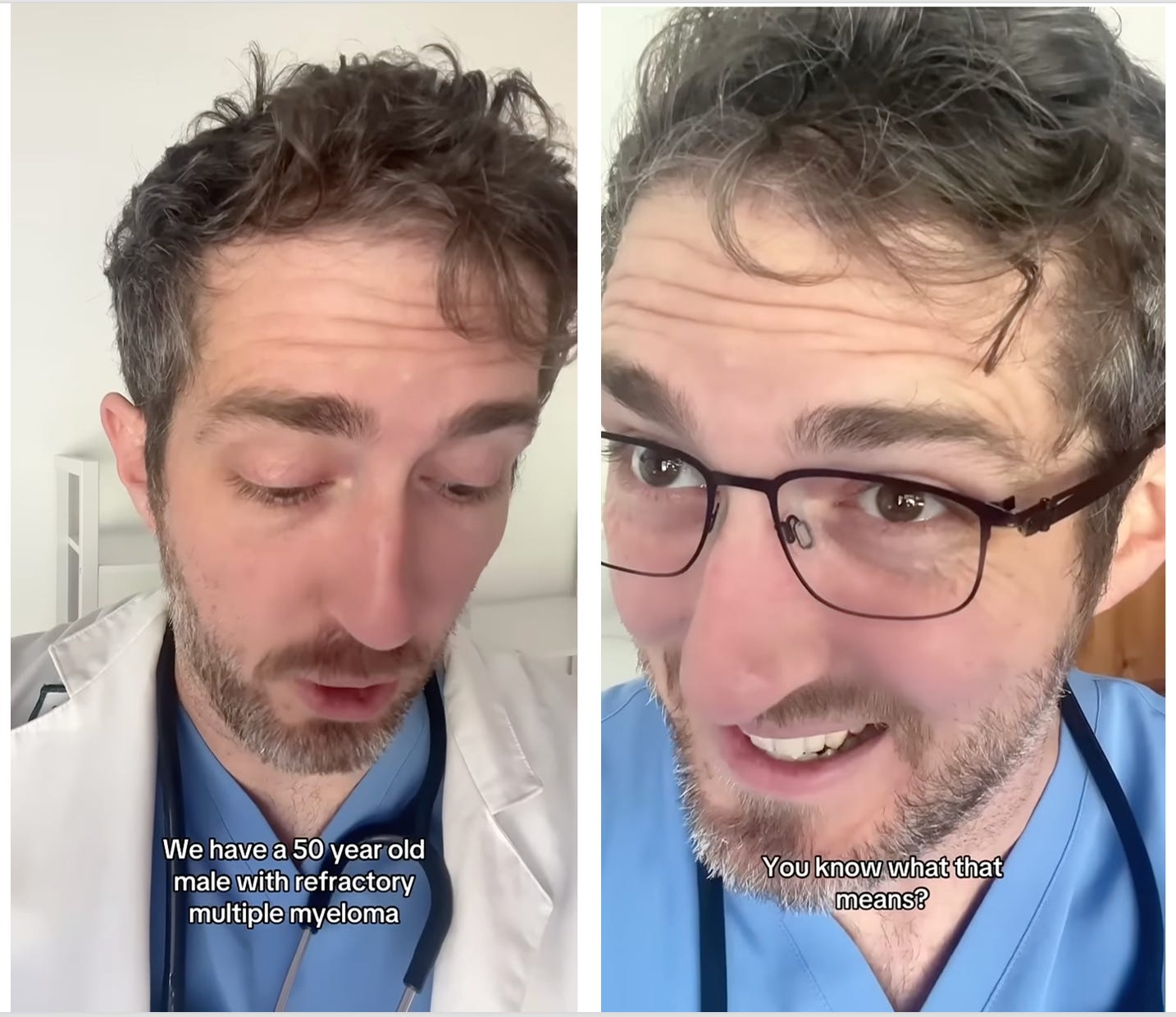Below is a brief video snippet from our conversation. Full videos of all Ground Truths podcasts can be seen on YouTube here. The current one is here. If you like the YouTube format, please subscribe! This one has embedded one of my favorite TikTok’s from Will. There are several links to others in the transcript. The audios are also available on Apple and Spotify.
Transcript with links to both audio and videos, commencement addresses, NEJM article coverage
Eric Topol (00:06):
Hi, it's Eric Topol from Ground Truths, and I've got an amazing couple with me today. It's Will Flanary and Kristin Flanary, the Glaucomfleckens. I've had the chance to get to know them a bit through Knock Knock, Hi! which is their podcast. And of course, everyone knows Dr. Glaucomflecken from his TikTok world and his other about 4 million followers on Instagram and Twitter and all these other social media, and YouTube. So welcome.
Will Flanary (00:43):
Thanks for having us.
Kristin Flanary (00:44):
Thank you. Happy to be here.
By Way of Background
Eric Topol (00:45):
Yeah. Well, this is going to be fun because I'm going to go a quick background so we can go fast forward because we did an interview back in early 2022.
Kristin Flanary (00:56):
Yes.
Eric Topol (00:57):
And what you've been doing since then is rocking it. You're like a meteoric, right. And it was predictable, like rarefied talent and who couldn't love humor, medical humor, but by way of background, just for those who are not up to speed. I guess you got your start, Will, as a class clown when your mother was a teacher in the sixth grade.
Will Flanary (01:22):
Yep, yep. I misbehaved a little bit. It helped that I still made good grades, but I cut up a bit in class.
Eric Topol (01:32):
And then you were already in the comedy club circuits doing standup in Houston as an 18-year-old.
Will Flanary (01:40):
It was all amateur stuff, nothing, just dabble in it and trying to get better. I was always kind of naturally funny just with my friend group and everything. I loved making people laugh, but doing standups is a whole different ball game. And so, I started doing that around Houston as a high school senior and kept that going through college and a little bit into med school.
Kristin Flanary (02:02):
Houston was a good training ground, right? That where Harris Wittels was also coming up.
Will Flanary (02:07):
Yeah. A lot of famous comedians have come through Houston. Even going back to Bill Hicks back in the, was that the 80s, I think? Or 90s?
Eric Topol (02:17):
Well, and then of course, it was I think in 2020 when you launched Dr. Glaucomflecken, I think. Is that right?
Will Flanary (02:28):
That's when it really started to take off. I was on Twitter telling jokes back in 2016.
Kristin Flanary (02:39):
GomerBlog before that, that's actually where it was born.
Will Flanary (02:41):
I was doing satire writing. I basically do what I'm doing now, but in article form, trying to be The Onion of medicine. And then the pandemic hit, started doing video content and that's really with lockdown. That's when, because everybody was on social media, nobody had anything else to do. So it was right place, right time for me and branching out into video content.
On to Medical School Commencement Addresses
Eric Topol (03:11):
Alright, so that's the background of some incredible foundation for humor. But since we last got together, I'll link the Medicine and the Machine interview we did back then. What has been happening with you two is nothing short of incredible. I saw your graduation speeches, Will. Yale in 2022, I watched the UCSF in 2023 and then the University of Michigan in 2024. Maybe there's other ones I don't even know.
Kristin Flanary (03:45):
There’s a few others.
Will Flanary (03:45):
There's a few. But I feel like you've done, I'm sure your fair share of commencement addresses as well. It's kind of hard to come up with different ways to be inspirational to the next generation. So fortunately, we have together, we have some life experiences and learned a thing or two by doing all of this social media stuff and just the things we've been through that I guess I have enough things to say to entertain an interest.
Eric Topol (04:18):
Well, you're being humble as usual, but having watched those commencement addresses, they were the best medical commencement addresses I've ever seen. And even though you might have told us some of the same jokes, they were so great that it was all right. Yeah, and you know what is great about it is you've got these, not the students, they all love you of course, because they're probably addicted to when's your next video going to get posted.
(04:44):
But even the old professors, all the family members, it's great. But one of the things I wanted to get at. Well, I'll start with the graduation speeches, because you were such an inspiration, not just with humor, but your message. And this gets back to you as a couple and the tragedies you've been through. So you really, I think, got into this co-survivor story and maybe Kristin, since you are the co-survivor of two bouts of Will’s testicular cancer, and then the sudden cardiac death. I mean, people don't talk about this much, so maybe you could help enlighten us.
Tragedies and Being a Co-Survivor
Kristin Flanary (05:26):
Yeah, it’s funny because the experience of being a co-survivor is nothing new. It’s as long as we've had human beings, we've had co-survivors. But the concept around it and giving it a name and a label, a framework to be able to think about it, that is what I think is new and what people haven't talked about before. So co-survivor is just this idea that when a medical trauma happens to a patient, the patient has their experience and if they survive it, they are a survivor and they have a survivor experience. And also, most people are closely attached to at least one other person, if not many. And those people are co-surviving the medical event along with the survivor. That event is happening in their lives as was happening to them too. If someone comes in with a patient to the hospital, that person, you can just assume by default that their lives are pretty intimately or profoundly intertwined or else why would that person be there? And so, thinking of it as there's the patient and then there's also a co-patient, that family members in the past have only been thought of as caregivers if they've been thought of at all. And that is certainly one aspect of the role, but it's important to remember that whatever it is that's happening to the patient is also affecting the family members' lives in a really deep and profound way.
Eric Topol (07:04):
That's really helpful. Now, the fact that you recognize that in your graduation speech, Will, I think is somewhat unique. And of course, some of the other things that you touched on like playing to your creativity and the human factors, I mean, these are so important messages.
Will Flanary (07:23):
Well, in the discussion about co-survivorship and because I talk about that whenever I do my keynotes and when I do the commencement addresses, but all credit goes to Kristin for really being the driving force of this idea for me and for many others because as a physician, we take care of patients. Our focus is always on the patient. And it really wasn't until this happened to me and my family and Kristin in particular that I started to understand exactly what she's talking about and this idea. And so, Kristin gets a lot of credit for just really bringing that term and that idea to the forefront.
Eric Topol (08:09):
Yeah, well, you saved his life. It's just not many have that bond. And then the other thing I just want to mention now, you've been recognized by the American Heart Association and a whole bunch of other organizations awarded because of your advocacy for CPR. And you even mentioned that I think in one of your commencement addresses.
Will Flanary (08:31):
Yeah, I tried to get the crowd to do CPR. Like team up, partner up, and it kind of fell flat. It wasn't quite the right time, I think, to try to do a mass class on CPR. So maybe next time.
Eric Topol (08:47):
Right. Well, so you had this foundation with the Glaucomflecken General Hospital and taking on 37 specialties and all these incredible people that became part of the family, if you will, of spoof on medicine and your alter ego and these videos that you would do. And sometimes you have three or four different alter egos in there playing out, but now you've branched into new things. So one which is an outgrowth of what we were just talking about. You've been on this country tour, Wife & Death.
“Wife and Death,” A Nationwide Tour
Kristin Flanary (09:28):
Yes.
Eric Topol (09:29):
Wife and death. I mean, yeah, I guess we can make the connect of how you named it that, but what is it you've been selling out in cities all over the country, and by the way, I'm really upset you haven't come to San Diego, but tell us about wife and death.
Will Flanary (09:44):
Yeah. Well, we have this amazing story and all these medical challenges we've been through, and then developing the Glaucomflecken brand and universe, and we've done keynotes together for years, and then we thought, let's have more fun with it. Let's do keynotes. They're great. We can get our message out, but sometimes they're just a bit stuffy. It's an academic environment.
Kristin Flanary (10:15):
They're usually at seven in the morning also, so that's the downside.
Will Flanary (10:21):
So we thought, let's just put together our own live show. Let's put together something that we could just creatively, we can do whatever we want with it. I could dress up as characters, Kristin, who has these beautiful writing and monologues that she's put together around her experience and just to create something that people can come into a theater and just experience this wide range of emotions from just laughter to tears of all kinds, and just have them feel the story and enjoy this story. Fortunately, it has a happy ending because I'm still alive and it's been so much fun. The audiences have been incredible. Mostly healthcare, but even some non-healthcare people show up, and we've been blown away by the response. Honestly, we should have done bigger theaters. That's our lesson for the first go round.
Eric Topol (11:21):
I saw you had to do a second show in Pittsburgh.
Will Flanary (11:24):
We did.
Kristin Flanary (11:26):
That one sold out too. Something about Pittsburgh, that was a good crowd, and there was a lot of them.
Will Flanary (11:33):
It was almost like in Pittsburgh, they rarely ever get any internet comedian ophthalmologists that come through. I don't know.
Eric Topol (11:41):
Well, I see you got some still to come in Denver and Chicago. This is amazing. And I wondered who was coming and I mean, it's not at all surprising that there'd be this phenomenal popularity. So that's one thing you've done that's new, which is amazing. And of course, it's a multidimensional story. The one that shocked me, I have to tell you, shocked me, was the New England Journal partnership. The New England Journal is the most stodgy, arrogant, I mean so difficult. And not only that.
Kristin Flanary (12:17):
You said that. Not us.
Partnering with the New England Journal of Medicine!
Eric Topol (12:19):
Yeah, yeah. They'll get this too. They know we don't get along that well, but that's okay. You even made fun of journals. And now you're partnering with the New England Journal, God's greatest medical journal, or whatever. Tell us about that.
Will Flanary (12:39):
Well, so one thing that I really enjoy doing, and I've done it with my US healthcare system content is almost like tricking people into learning things. And so, if you make something funny, then people will actually sit there and listen to what you have to say about deductibles and physician-owned hospitals and all these inner workings. DIR fees and pharmacy, all these things that are really dry topics. But if you can make them funny, all of a sudden people will actually learn and listen to it. And the New England Journal of Medicine, they approached me with an idea. Basically just to take one or two of their trials per month. And I just make a skit out of that trial with the idea being to help disseminate some of the research findings that are out there, because I guess it's getting harder and harder for people to actually read, to sit down and read a journal article.
(13:43):
And so, I have to credit them for having this idea and thinking outside the box of a different way to get medical information and knowledge out to the masses. And you're absolutely right, that I have been critical of journals, and particularly I've been critical of the predatory nature of some of the larger journals out there, like Elsevier. I've specifically named Elsevier, Springer, these journals that have a 40% profit margin. And I certainly thought about that whenever I was looking into this partnership. And the reason I was okay with doing it with the New England Journal is because they're a nonprofit, first of all, so they're run by the Massachusetts Medical Society. That's the publisher for that journal. And so, I feel okay partnering with them because I feel like they're doing it in a much better way than some of the bigger journal corporations out there.
Kristin Flanary (14:54):
Well, and also part of the deal that we negotiated was that those articles that you make skits about those will be available open access.
Will Flanary (15:03):
Oh yeah. That was a prerequisite. Yes. It was like, if I'm going to do this, the articles that I'm talking about need to be free and readily available. That's part of it.
Eric Topol (15:14):
I think you've done about five already, something like that. And I watched them, and I just was blown away. I mean, the one that got me where I was just rolling on the floor, this one, the Belantamab Mafodotin for Multiple Myeloma. And when you were going on about the Bortezomib, Dexamethasone. We'll link to this. I said, oh my God.
Will Flanary (15:40):
Yeah. The joke there is, you don't have any idea how long it took me to say those things that quickly. And so, I was writing this skit and I'm like, wouldn't it be funny if somehow that triggered a code stroke in the hospital because this person is saying all these random words that don't have any meaning to anybody. Man, I tell you, I am learning. Why would I ever need to know any of this information as an ophthalmologist? So it's great. I know all this random stuff about multiple myeloma that I probably would never have learned otherwise.
Kristin Flanary (16:21):
It's the only way, you won't read a journal either.
Eric Topol (16:23):
Well, and if you read the comments on the post. These doctors saying, this is the only way they want to get journal information from now on.
Will Flanary (16:33):
Which is double-edged sword, maybe a little bit. Obviously, in a 90 second skit, there's no way I'm going to cover the ins and outs of a major trial. So it's really, in a lot of ways, it's basically like, I call it a comedy abstract. I’m not going much further than an abstract, but hopefully people that are actually interested in the topic can have their interest piqued and want to read more about it. That's kind of the idea.
Eric Topol (17:06):
Yeah. Well, they're phenomenal. We'll link to them. People will enjoy them. I know, because I sure did. And tenecteplase for stroke and all that you've done. Oh, they're just phenomenal.
Will Flanary (17:20):
Every two weeks we come out with a new one.
Eric Topol (17:24):
And that is basically between the fact that you are now on the commencement circuit of the top medical schools and doing New England Journal videos on their articles. You've crossed a line from just making fun of insurance companies and doctors of specialties.
Kristin Flanary (17:44):
Oh, he has crossed many lines, Dr. Topol.
Eric Topol (17:46):
Yeah. Oh yeah. Now you've done it, really. Back two years ago when we convened, actually it's almost three, but you said, when's it going to be your Netflix special?
Will Flanary (18:02):
Oh, gosh.
Eric Topol (18:02):
Is that in the works now?
Will Flanary (18:04):
Well, I'll tell you what's in the works now.
Kristin Flanary (18:06):
Do you know anyone at Netflix?
Will Flanary (18:09):
A New Animated Series
No. We're working on an animated series.
Eric Topol (18:12):
Oh, wow. Wow.
Will Flanary (18:13):
Yeah. All these characters. It's basically just this fictional hospital and all these characters are very cartoonish, the emergency physician that wears the bike helmet and everything. So it's like, well, what do we have together? What do we, Kristin and I have time for? And it wasn't like moving to LA and trying to make a live action with actors and do all, which is something we probably could have tried to do. So instead, we were like, let's just do an animated series.
Kristin Flanary (18:48):
Let's have someone else do the work and draw us.
Will Flanary (18:51):
So we've worked with a writer for the first time, which was a fun process, and putting together a few scripts and then also an animator. We learned a lot about that process. Kristin and I are doing the voiceovers. And yeah, it's in process.
Kristin Flanary (19:10):
We're the only actors we could afford.
Will Flanary (19:12):
Right, exactly.
Eric Topol (19:13):
I can't wait to see it. Now when will it get out there?
Will Flanary (19:17):
Well, we're hoping to be able to put it out on our YouTube channel sometime early next year. So January, February, somewhere around there. And then we can't fund the whole thing ourselves. So the idea is that we do this, we do this pilot episode, and then we'll see what kind of interest we can generate.
Eric Topol (19:37):
Well, there will be interest. I am absolutely assured of that. Wow.
Will Flanary (19:42):
Let us know if you know anybody at the Cartoon Network.
Kristin and Will Flanary (19:45):
Yeah, we're open to possibilities. Whatever, Discovery channel. I don't know.
Eric Topol (19:51):
You've gotten to a point now where you're ready for bigger things even because you're the funniest physician couple in medicine today.
Kristin Flanary (20:05):
Well, that's a very low bar, but thank you.
Will Flanary (20:08):
There are some funny ones out there, but yeah, I appreciate that.
Eric Topol (20:11):
Well, I'm a really big comedy fan. Every night I watch the night before, since I'm old now, but of Colbert and Jimmy Kimmel, just to hear the monologues. Trevor Noah, too. And I can appreciate humor. I'll go to see Sebastian Maniscalco or Jim Gaffigan. That's one of the things I was going to ask you about, because when you do these videos, you don't have an audience.
Will Flanary (20:39):
Oh yeah.
Eric Topol (20:40):
You're making it as opposed to when you are doing your live shows, commencement addresses and things like that. What's the difference when you're trying to be humorous, and you have no audience there?
Will Flanary (20:55):
Well, whenever I'm filming a skit, it's just all production. In fact, I feel like it's funny. I think it's funny, but it's really not until I see the response to it, or I show Kristin, or what I have is where I really know if it's going to work. It's great to put the content out there and see the responses, but there's nothing like live interaction. And that's why I keep coming back to performing. And Kristin's been a performer too in her life. And I think we both really enjoy just the personal interaction, the close interaction, the response from people to our story.
Kristin Flanary (21:36):
We do most of our work alone in this room. I do a lot of writing. He does a lot of playing.
Will Flanary (21:44):
Dress up.
Kristin Flanary (21:44):
All the people in his head, and we do that very isolated. And so, it's very lovely to be able to actually put names to faces or just see human bodies instead of just comments on YouTube.
Will Flanary (21:59):
Meet people.
Kristin Flanary (21:59):
It's really nice.
Will Flanary (22:01):
We’ve been doing meet and greets at the live shows and seeing people come up wearing their costumes.
Eric Topol (22:07):
Oh, wow.
Will Flanary (22:11):
Some of them talk about how they tell us their own stories about their own healthcare and talk about how the videos help them get through certain parts of the pandemic or a difficult time in their life. And so, it reinforces that this means something to a lot of people.
Kristin Flanary (22:29):
It's been really fun for me, and probably you too, but to get to see the joy that he has brought so many people. That's really fun to see in person especially.
Eric Topol (22:42):
No question. Now, when you're producing it together, do you ever just start breaking into laughter because it's you know how funny this is? Or is it just you're on kind of a mission to get it done?
Will Flanary (22:54):
Well, the skits I do by myself. And sometimes when I'm writing out the skit, when I'm writing the skit itself, I will laugh at myself sometimes. Not often, but sometimes they're like, oh, I know that's really funny. I just wrote a skit that I'm actually going to be debuting. I'm speaking at the American Academy of PM&R, so the big PM&R conference. I'm writing a skit, it's How to Ace your PM&R residency interview.
Will Flanary (23:28):
I was writing up that skit today and kind of chuckling to myself. So sometimes that happens, but whenever we do our podcast together, we definitely have outtakes.
Kristin Flanary (23:38):
Oh yeah, we've got some.
Will Flanary (23:40):
We crack each other up.
Kristin Flanary (23:41):
We do.
Will Flanary (23:42):
Sometimes we're getting a little punchy toward the end of the day.
Eric Topol (23:47):
And how is the Knock Knock, Hi! podcast going?
Will Flanary (23:51):
It's awesome. Yeah.
Kristin Flanary (23:52):
Yeah. It's a really fun project.
Will Flanary (23:54):
We still enjoy. You can work with your spouse and in close proximity and still be happily married. So it's doable everyone.
Kristin Flanary (24:06):
That's right. And we're in that phase of life that's really busy. We've got kids, we've got a gazillion jobs. House, my parents are around, and so it's like the only time all week that we actually get to sit down and talk to each other. So it's actually kind of like a part of our marriage at this point.
Will Flanary (24:28):
We’re happy to involve the public in our conversations, but we couldn't do it because we have all these things going on, all our hands and all these little places. We can't do it without a team.
Kristin Flanary (24:41):
Yeah, absolutely.
Will Flanary (24:41):
And that's the thing that I've learned, because I've always been a very loner type content creator. I just wanted to do it all myself. It's in my head and I have trouble telling others, describing what's in my head. And Kristin and our producers have helped me to be able to give a little bit of control to others who are really good at what they do. And that's really the only way that we've been able to venture out into all these different things we've talked about.
Eric Topol (25:12):
Well, I think it comes down to, besides your ability to get to people in terms of their laughter receptors, you have this incisive observer capability. And that's one of the things I don't, I can't fathom because when you can understand the nuances of each specialty or of each part of healthcare, and you haven't necessarily interacted with these specialists or at least in recent years, but you nail it every time. I don't know how you do it, really that observational, is that a central quality of a comedian, you think?
Will Flanary (25:52):
There's definitely a big part of that. You got to get the content from somewhere. But for the specialties, it's really first about just getting the personalities down. And that doesn't change over time.
Kristin Flanary (26:08):
Or around the world.
Will Flanary (26:09):
Or around the world. We hear from people from all over the world about, oh, it's the same in Guatemala as it is in the US.
Kristin Flanary (26:18):
Surgeons are the same.
Will Flanary (26:19):
Yeah.
Kristin Flanary (26:20):
Emergency is the same.
Will Flanary (26:21):
Which has been really cool to see. But so, I draw on my experience interacting with all these specialties back in my med school and intern days. You're right, as an ophthalmologist, we don't get out very much.
Eric Topol (26:33):
No.
Will Flanary (26:35):
So very few people have ever seen an ophthalmologist. We do exist. But then beyond that, I do have to include some actual medical things. And so, I actually, I do a lot of research. I find myself learning more about other fields sometimes than I do in my own field. So especially the further out I get from med school, I know less and less.
Eric Topol (27:00):
Yeah, that's what I was thinking. But you're always spot on. It's interesting to get that global perspective from both of you. Now you're still doing surgery and practicing ophthalmology. Have you reduced it because this has just been taking off so much more over the recent years or keeping it the same?
Will and Kristin Flanary (27:21):
Nope, I’m still. Do you know how many years I had to come along on all of this medical training? He is not allowed to give this up.
Will Flanary (27:29):
I know there's something called a sunk cost fallacy, but this is no fallacy. There's enough of a sunk cost. I got to stick with it. No, I still enjoy it. That's the thing. It actually, it informs my comedy, it grounds me. All of the social media stuff is built upon this medical foundation that I have. And if I stopped practicing, I guess I could maybe cut back. But I'm not planning on doing that. If I stop practicing medicine, I feel like it would make my content less.
Kristin Flanary (28:07):
Authentic.
Will Flanary (28:08):
Less authentic, yeah. That's a good way to put it.
Eric Topol (28:09):
Yeah, no, that makes a lot of sense. That's great you can get that balance with all the things you're doing.
Will Flanary (28:17):
And if I stop practicing medicine, they're not going to invite me to any more commencement addresses, Dr. Topol. So I got to draw the line somewhere.
Eric Topol (28:28):
One of the statements you made at some point earlier was, it was easier to go to become a doctor than to try to be a comedian. And yeah, I mean you proven that.
Will Flanary (28:38):
A lot of ways. That's true.
Eric Topol (28:40):
Wow. I am pretty awestruck about the rarefied talent that you bring and what you both have done for medicine today. And the thing is, you're so young, you have so much time ahead to have an impact.
Will Flanary (28:57):
You hear that Kristin, we're young. Look at that.
Kristin Flanary (29:00):
That's getting less and less true.
Will Flanary (29:01):
Kristin, she just turned 40. It's right around the corner for me. So I don't know.
Will Flanary (29:11):
We got some years left.
Eric Topol (29:12):
You're like young puppies. Are you kidding? You're just getting started. But no, I think that what you brought to medicine in terms of comedy, there's no other entity, no person or people like you have done. And just the last thing I want to ask you about is, you have a platform for advocacy. You've been doing that. We talked about co-survivor. We talked about nurturing the human qualities in physicians like creativity and also taking on the insurance companies, which are just monstrous. I'll link a couple of those, but the brain MRI one or the Texaco.
Will Flanary (29:54):
Texaco Mike.
Eric Topol (29:55):
Yeah, that one is amazing. But there is so many. I mean, you've just taken them apart and they deserve every bit of it. Do you have any other targets for advocacy or does that just kind of come up as things go?
Will Flanary (30:08):
It kind of comes up as things go. There's things I keep harping on. The prior authorization reform, which I've helped in a couple of different states. There's a lot of good people around the country doing really good work on prior authorization and reforming that whole process. And I've been able to just play a small part in that in a couple of different ways. And it's been really fun to do that. And so, I do plan on continuing that crusade as it were. There's certain things I'd like to see. I've been learning more about what pharmacists are dealing with as well as a physician. Unfortunately, we are very separate in a lot of ways and just how we come up in medicine. And so, I have had my eyes opened a lot to what community pharmacists are dealing with. For all the terrible things that we have to deal with as physicians in the healthcare system. Pharmacists have just as much, if not more of the things that they're doing that are threatening their livelihoods. And so, I had love to see some more reform on the PBM side of things, pharmacy benefit managers, Caremark, Optum, all of them. They're causing lots of problems.
Eric Topol (31:24):
I couldn't agree with you more. In fact, I'm going to have Mark Cuban on in a few weeks and we're going to get into that. But the pharmacists get abused by these chains.
Will Flanary (31:33):
Oh, it's bad. It's really bad.
Eric Topol (31:35):
Horrible, horrible. I feel, and every time I am in a drugstore working with one of them, I just think what a tough life they have to deal with.
Will Flanary (31:45):
I guess from an advocacy standpoint, the good news is that there's never a shortage of terrible injustices that are being foisted upon the public and physicians and healthcare workers.
Kristin Flanary (31:59):
Yes. The US healthcare system is ripe for advocacy.
Will Flanary (32:01):
Yes. And that's a lesson that I tell people too, and especially the med students coming up, is like, there's work to be done and get in touch with your state societies and there's always work to be done.
Eric Topol (32:18):
Now you've stayed clear of politics. Totally clear, right?
Will Flanary (32:24):
For the most part, yeah. Yeah. It depends on what you consider politics. It depends on what you consider politics.
Eric Topol (32:32):
It being election day, you haven't made any endorsements.
Will Flanary (32:36):
I haven't. And I don't know. I can only handle so much. I've got my things that I really care about. Of course I'm voting, but I want to talk on the things that I feel like I have the expertise to talk about. And I think there's nothing wrong with that. Everybody can't have an opinion on everything, and it means something. So I am happy to discuss the things that I have expertise about, and I'm always on the side of the patient and wanting to make life better for our patients. And that's the side I'm on.
Kristin Flanary (33:25):
I think also he never comes out and explicitly touches on certain topics, but it's not hard to tell where he falls.
Will Flanary (33:34):
If you really want read into it all.
Kristin Flanary (33:38):
It's not like it's a big secret.
Eric Topol (33:40):
I thought that too. I'm glad you mentioned it, Kristin. But it doesn't come out wide open. But yeah, it's inferred for sure.
Eric Topol (33:49):
I think the point being there is that because you have a reach, I think there's no reach that it has 4 million plus people by your posts and no less the tours and keynotes and everything else. So you could go anywhere but sticking to where you're well grounded, it makes a lot of sense. And anyway, I am going to be staying tuned. This is our two-year checkup. I'm hoping you're going to come to San Diego on your next tour.
Kristin Flanary (34:21):
We're working on 2025 plans.
Will Flanary (34:23):
Oh, we got more shows coming up. And we'll hit up other parts of the country too.
Eric Topol (34:28):
I feel like I got to meet you in person, give you a hug or something. I just feel like I'm missing out there. But it's just a joy to have had a chance to work with you on your podcast. And thanks for coming back on one of mine. There's lots of podcasts out there, but having you and joining you is such fun. So thank you.
Will Flanary (34:54):
This has been great. Thank you for having us.
Kristin Flanary (34:55):
Yeah, thank you.
*****************************************
Thank you for reading, listening and and subscribing to Ground Truths.
If you found this fun and informative please share it!
Yes, laughter is the best medicine.
All content on Ground Truths—its newsletters, analyses, and podcasts, are free, open-access.
Paid subscriptions are voluntary. All proceeds from them go to support Scripps Research. Many thanks to those who have contributed—they have greatly helped fund our summer internship programs for the past two years.
Thanks to my producer Jessica Nguyen and to Sinjun Balabanoff for audio and video support at Scripps Research.
Note on Exodus from X/twitter:
Many of you have abandoned the X platform for reasons that I understand. While I intend to continue to post there because of its reach to the biomedical community, I will post anything material here in the Notes section of Ground Truths on a daily basis and cover important topics in the newsletter/analyses.












Share this post